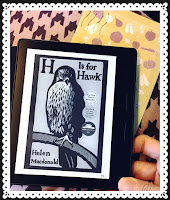
Helen MacDonald's memoir 'H is for Hawk' (2014) turned out be absolutely fascinating. It tells of how she worked through her grief and mild depression by spending a year training a goshawk after her father's (respected photojournalist Alisdair MacDonald) sudden passing from a heart attack in 2007. (Reviews here, here, here, here and here.)
Helen is a adept falconer. She has trained and flown many peregrine falcons and merlins, but not a goshawk. A falcon and a hawk are completely different in temperament and obedience. Remembering her experiences in Uzbekistan, she felt compelled to purchase and train one in Cambridge, England. She named the baby goshawk Mabel.
I'm standing there, my sorry human eyes overwhelmed by light and detail, while the hawk watches everything with the greedy intensity of a child filling in a coloring book, scribbling joyously, blocking in colour, making the pages its own. And all I can think is, I want to go back inside.
The author weaves in 'The Goshawk' (1951) by British writer T.H. White (who lived 1906-1954). I'm not a fan of 'The Once and Future King' or 'The Sword in Stone'. However, it made me pause in my reading of this memoir and scramble to scan through this particular book by White first, a record of him using medieval methods to train his goshawk in the 1930s. White is a tortured and conflicted individual living with the shadows of an unfortunate and emotionally cold childhood. I get why Helen MacDonald would quote White in this memoir, but I don't understand why she picked out so many chunks of 'The Goshawk', even if she's fighting an internal battle to prove the book wrong. The many many long quotes from White's book kinda spoil the rhythm. Grrrr.
He nods, and I do too, and in some wonder, because I am beginning to see that for some people a hawk on the hand of a stranger urges confession, urges confidences, lets you speak words about hope and home and heart. And I realise, too, that in all my days of walking with Mabel the only people who have come up and spoken to us have been outsiders: children, teenage goths, homeless people, overseas students, travelers, drunks, people on holiday. 'We are outsiders now, Mabel.' I say, and the thought is not unpleasant. But I feel ashamed of my nation's reticence. Its desire to keep walking, to move on, not to comment, not to interrogate, not to take any interest in something peculiar, unusual, in anything that isn't entirely normal.
It was with relief when I reached the end of the book to know that the author felt better by the next spring. She dropped off Mabel at a trusted aviary so that the young goshawk could do her first moult into adult plumage. BUT. If you read the end notes, you'd discover that Mabel passed away in 2013 from aspergillosis, a sudden airborne fungal infection. I was crushed. 😢
No comments:
Post a Comment